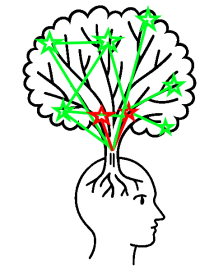Examples of high-contextual thinking
Uiterlijk

Positive consequences
- can change perspectives: thinks in second- and third-degree perspectives (“What does the other think that another thinks?”)
- makes nuanced decisions: takes into account the past, future, sensitivities, and long-term consequences
- understands implicit communication: grasps context, subtext, and non-verbal cues
- has good self-reflection: recognizes their own patterns and can adjust their course
- is strong in systems thinking: oversees complex structures (e.g., IT, policy, relationships)
- is relationally attuned: shows empathy, sees through tensions, and anticipates emotional dynamics
Negative consequences
- can become indecisive: sees too many options and risks, which blocks action
- tends towards over-responsibility: takes everything into account, even things that are not his/her own
- risk of avoidance or procrastination: too much thinking leads to no action
- finds it difficult to connect with direct-thinking people: mutual misunderstanding arises
- can get caught up in self-analysis: risk of worrying, doubt, over-controlling
- no overload as with low-complex thinking, but there is a risk of mental exhaustion due to over-contextualizing
Examples
Casus
A colleague is late for a meeting.
The high-contextual thinker doesn't immediately think "he is rude," but takes various contexts into account: traffic jam, sick children, previous meeting ran late.
This makes the reaction nuanced, but also hesitant: "How do I react without doing the other person an injustice?"
Casus
A partner reacts curtly in a conversation.
The high-contextual thinker immediately analyzes the broader context: “Is she tired? Is there tension at work? Does she mean something implicitly?”
The nuance helps to react empathetically, but can also lead to doubt and procrastination in naming something directly.
Casus
In a policy meeting, a proposal is made.
The high-contextual thinker immediately sees the long-term consequences and the impact on multiple stakeholders. He/she brings this up, but notices that direct thinkers get annoyed: "Why always make things difficult? We'll just decide."
The difference in thinking style leads to misunderstandings.
Casus
During self-reflection, the high-contextual thinker notices that he/she often takes on too much responsibility for others.
The intention is good (relieving others), but it can lead to overload and frustration if this is not recognized.